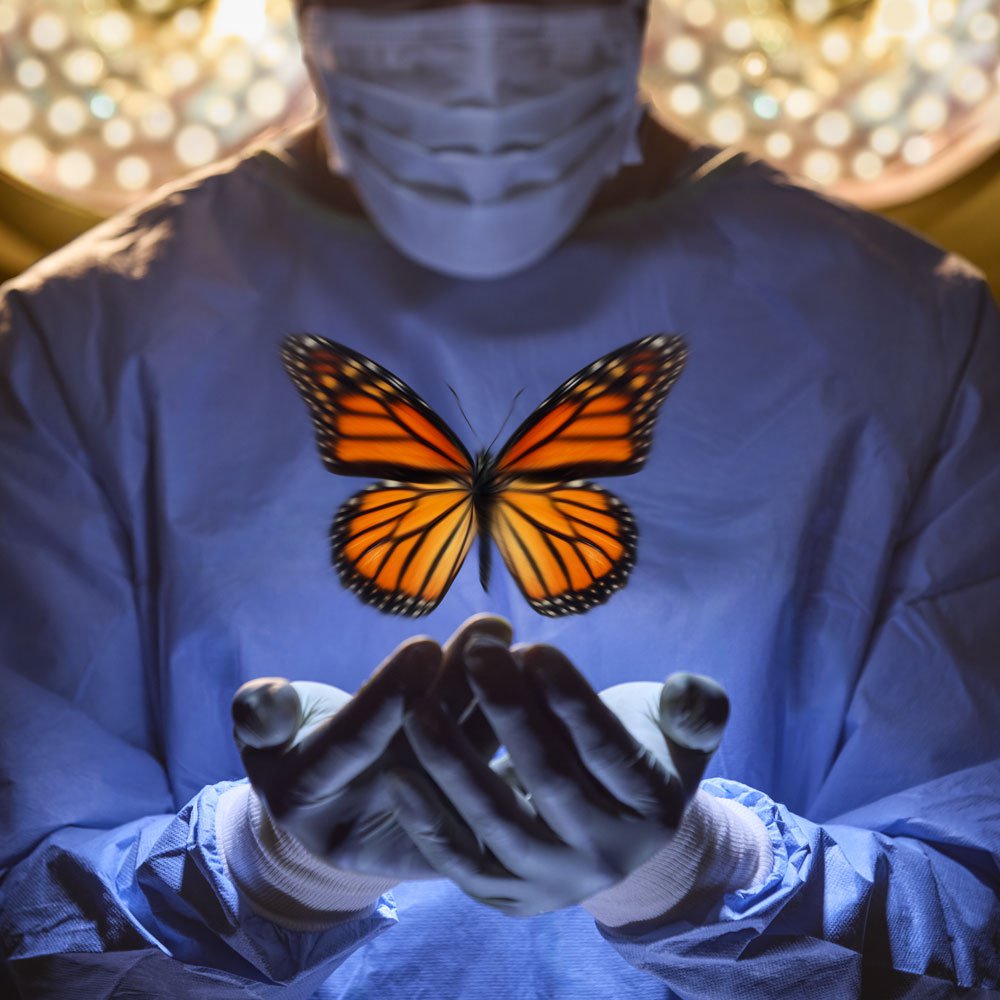result




TRANSLATIONAL RESEARCH
BUTTERFLY FROM THE DARKNESS

The Dunn Foundation Meets Hardship With a Human Touch
The so-called “butterfly effect” is a collision of science and theory. It suggests that the slightest variance in the conditions surrounding an event can radically affect its outcome. On a rainy day in March 1963, a twin-engine plane went down near Andrau Airpark in West Houston. The singular conditions of the incident — including a father’s profound love for his son — would set off a cascade of events whose ripples today benefit thousands of patients in Houston and beyond.
“I didn’t volunteer to go down in that plane,” says John S. “Steve” Dunn, Jr., of his decision that day to visit Houston before returning to law school at The University of Texas. “It changed the trajectory of not only my life but also my family’s, particularly my father’s.”
Steve suffered burns over 75 percent of his body in the crash. The hours following were a blur of pain and motion, but he recalls the presence of his father at his side during the excruciating ambulance ride from Spring Branch to the Texas Medical Center (TMC).
John S. Dunn, a prominent businessman and founder of the eponymous insurance firm, was deeply affected by his son’s anguish on that jolting ride. A man of action inspired by humble roots, John eventually would have Steve transferred to Houston Methodist for essential — and at times pioneering — burn care. He then worked with acclaimed TMC surgeon Dr. James “Red” Duke to make Houston home to the second critical care “air med” service in the nation, known today as Life Flight®.
Father and son never forgot the care received at Houston Methodist. Today, the John S. Dunn Foundation and the institution share a 35-year history of realizing life-changing advances in science and education.
“We put a great deal of confidence in Houston Methodist because we consider it the best of the best in multidisciplinary care,” says longtime foundation board officer David Key. In fact, a transformational gift in 1987 prompted the naming of the John S. Dunn Tower, which at the time established the hospital’s status as the largest private teaching hospital in the country.

“The generosity of the John S. Dunn Foundation exemplifies the transformational impact that is possible through philanthropy. To a person, its board members have helped write the history — and the future — of Houston. ”
Susan Coulter, JD
Former President and CEO
Houston Methodist Hospital Foundation
Since then, the Dunn Foundation has funded nine endowed positions at Houston Methodist — the most of any single philanthropic organization — ranging from a hallmark investment in brain cancer research to support for behavioral health, cardiac care, biomedical informatics and orthopedic surgery. A recent gift also established the John S. Dunn Foundation Advancing Nursing Excellence Award to recognize exemplary early-career nurses. Trustee Terri Lacy explains that staying engaged with hospital leadership on current channels of need and conducting annual visits with Dunn chairholders keep foundation members plugged in to progress.
Perhaps the foundation’s most visible fingerprint in recent years lies in the Eva Lynn and John S. Dunn, Jr. Center for Research and Education in Reconstructive and Plastic Surgery — and a 2023 gift to enhance the center through the addition of the Eva Lynn and John S. Dunn, Jr. New Century Chair in Reconstructive and Plastic Surgery, currently held by Dr. Michael J. Klebuc. The center pairs world-class research with residency programs to bring young physicians together with leading minds in the field, including Dr. Klebuc — whose work in advanced microsurgery has made him a global authority in facial nerve reconstruction.
“Reconstructive microsurgery is a discipline that allows a surgeon to move large volumes of tissue from one part of the body to another and ‘hook up’ the nerves and blood vessels to allow muscles and nerves to function again,” explains Dr. Jeffrey D. Friedman, the Cathy and Ed Frank Centennial Chair in Plastic and Reconstructive Surgery and division chief of reconstructive surgery.
“We owe much of our academic and clinical success to Steve and Eva Lynn and the Dunn Foundation, who recognize the complexity and importance of such procedures — allowing us to bring new therapies and medical devices to patients,” he continues.
“It’s almost mind-boggling what we see doctors of this caliber accomplish,” says Charles Lusk III, Dunn Foundation board president. “The bottom line is that we see the great things that they are doing with the support they receive.”
Eva Lynn Dunn, Steve’s wife, would be the first to agree. In 2014, she underwent lifesaving surgery that required a simultaneous microsurgical procedure by Dr. Friedman. Of her care and interaction with the surgical team, she says, “They are just as fine people as they are surgeons.”
These days, the couple acknowledges the delicate balance of living life with gratitude, just as the ephemeral butterfly dances on each new day’s breeze. Together, they hold to the mantra Make something good come out of everything. More than 60 years after the accident that nearly claimed his life, Steve reflects: “My dad taught me that. I am very proud of him for making a difference.”
9
ENDOWED CHAIRS & PROFESSORSHIPS
The Dunn Foundation has funded nine endowed positions at Houston Methodist — the most of any single philanthropic organization — ranging from a hallmark investment in brain cancer research to support for mental health, cardiac care, bioinformatics and orthopedic surgery.

Dr. Michael J. Klebuc holds the Eva Lynn and John S. Dunn, Jr. New Century Chair in Reconstructive and Plastic Surgery
Discover More

